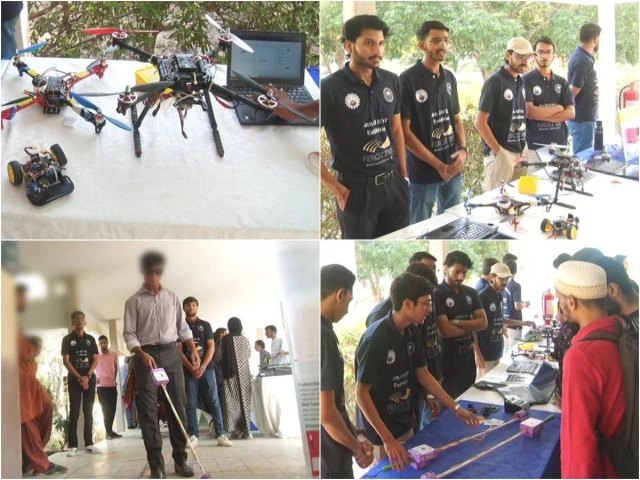Students showcase solutions that address real-world challenges, from helping the visually impaired to optimizing solar energy.
Final year students from NED University of Engineering and Technology showcased their exceptional creativity and technical inventiveness at an exhibition. His latest inventions included a smart sensor for the visually impaired, a drone for cleaning solar panels, a fire and smoke detector, and a smart vehicle parking system.
A total of 27 projects were showcased, with AI and IoT innovations attracting the most attention due to their potential to transform industries and improve living standards.
One of the most impressive innovations came from Syed Rohan, a student in the Department of Electrical Engineering, who introduced a smart sensor designed specifically for the visually impaired. Priced at an affordable Rs 3,000, the device is equipped with audio and ultrasonic sensors that detect obstacles in the user’s path and alert them through sound and vibration.
talking to The express PAkGazetteRohan said that while the basic model was highly functional, the device could be further improved with machine learning to help distinguish between different objects, such as vehicles, bicycles or walls.
This would allow for a more intuitive experience for users, making the device even more effective in real-world environments. The low cost of the cane makes it an accessible tool for people with visual disabilities, allowing them to navigate their environment with greater ease and independence.
Another interesting project was presented from the Department of Mechanical Engineering, an AI-based drone system for cleaning solar panels. Developed at a cost of Rs 150,000, the drone uses high-tech cameras and artificial intelligence to automatically detect dust and dirt on the solar panels and activate its cleaning mechanism.
Shayan Ali, one of the developers behind the project, said the system not only conserves water but also saves time and energy by cleaning only the panels that are dirty, thereby reducing unnecessary resource consumption. This system is especially beneficial for large solar farms, where maintaining panel cleanliness is crucial for efficiency. Ali added that the drone can operate autonomously, enhancing its usefulness in large-scale solar installations.
In the area of safety and security, another student presented a fire and smoke detection mechanism, aimed at improving safety in both residential and industrial environments. The system is designed to detect smoke or fire at an early stage and activate an alarm, which could prevent serious accidents and save lives.
This detection system can be easily installed in homes, factories and large industrial units, making it an essential tool for improving safety standards. The innovation is particularly timely, given the growing awareness of fire risks and the need for better preventative measures across the country.
Other projects highlighted at the exhibition included a renewable energy estimation system, a smart vehicle parking solution and improvements in additive manufacturing (3D printing) processes. Each of these projects demonstrated the students’ commitment to addressing pressing social and industrial challenges through technological innovation.
The intelligent vehicle parking system is designed to optimize parking spaces in urban areas, alleviate congestion and reduce the environmental impact of vehicle emissions by streamlining the parking process.
Meanwhile, the renewable energy estimation system provides real-time data on energy generation from solar panels, helping to optimize energy use in homes and businesses.
The students emphasized that their projects were not just academic exercises, but practical solutions aimed at real-world problems, encouraging innovation and applied research in Pakistan. By focusing on social impact technologies, the exhibition highlighted the potential of local students to contribute to global technological advancements.
Through these projects, students demonstrated that technology is not only a tool for commercial profit, but can also be a powerful force for social change, contributing to sustainable development and a better quality of life.




